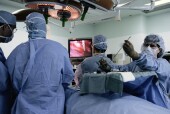
THURSDAY, June 2 (HealthDay News) — Noisy operating rooms appear to put patients at greater risk for surgical site infections, new study findings suggest.
In the report, published in the July issue of the British Journal of Surgery, the Swiss researchers also said these surgical site infections, or SSIs, are associated with longer, more costly hospital stays.
“SSIs lead to patients spending up to 13 days longer in hospital, making their stay cost up to three times as much,” Dr. Guido Beldi, staff surgeon and research group leader, from the department of visceral surgery and medicine at Berne University Hospital, said in a journal news release.
Beldi’s team examined 35 patients who underwent planned, major abdominal surgery, taking into account demographic parameters, the length of their surgery and the level of noise in the operating room.
Six of the patients developed surgical site infections, but the research showed that the only variable in each case was the noise level in the operating room, which was notably higher for the infected patients.
“Having found a significant association between SSIs within 30 days of surgery and increased sound levels in the operating theater, we can only conclude that noise is associated with a stressful environment or lack of concentration and this impacts on the surgical outcome,” Beldi said.
The study reported that sound levels rose 60 minutes after the surgery began, indicating the level of noise could be related to the intensity or increased difficulty of the surgical procedure. The authors noted that to suggest a lack of concentration among the surgical staff would be purely speculative.
“Each of these factors may increase the risk of SSIs and other complications, and further studies looking at the source of operating theater noise and its specific influence on the behavior and performance of surgeons is warranted,” Beldi said.
More information
The U.S. Centers for Disease Control and Prevention provides more information on surgical site infections.

